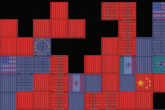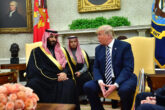December 12, 2019
Beyond the Trade War
A Competitive Approach to Countering China
The verdict is in on U.S. President Donald Trump’s trade war with China. Regardless of whether U.S. negotiators soon reach a deal with Beijing, the administration’s initial gambit has run aground. After wreaking havoc on portions of the U.S. economy with his trade policies, the president is now angling to freeze or roll back tariffs on Chinese products in exchange for almost nothing. Deal or no deal in the coming days, it is clear that the United States needs a fundamentally different approach to economic competition with China—one that bolsters U.S. technological and financial power while countering Beijing’s malign activities directly.
Tariff hikes haven’t forced Beijing to capitulate. Chinese negotiators are reportedly making only vague commitments to assuage U.S. concerns about currency manipulation and intellectual property theft. They have refused outright to accept a much-needed enforcement mechanism on international trade practices or to make structural reforms to promote economic competition at home and abroad. At best, Beijing will restore agricultural purchases to pre–trade war levels, offering as its biggest concession something it wants to do anyway: let in more U.S. capital to balance China’s checkbook and reenergize sluggish growth.
Read the full article in Foreign Affairs.
Explore a series of recommendations for policymakers by Martijn Rasser, Elizabeth Rosenberg and Paul Scharre:

The China Challenge
The United States and China are strategic competitors, and technology is at the center of this competition, critical to economic strength and national security. The United Sta...
Read MoreMore from CNAS
-
Game Over?
The trade wargame suggests that sustained high tariffs could create leverage and urgency to spur action toward a productive restructuring of the international trade system....
By Emily Kilcrease & Geoffrey Gertz
-
Middle East Security / Energy, Economics & Security
Trump Inks $600 Bn Deal In Saudi Arabia | Musk, Blackrock CEO Flank Trump In Gulf VisitIn today's episode of India Global, U.S. President Donald Trump secured a $600 billion commitment from Saudi Arabia on Tuesday to invest in the United States. NDTV's Gaurie Dw...
By Daniel Silverberg
-
Energy, Economics & Security / Technology & National Security
Tariffs and Tech: An Uncertain RecipeHigher tariffs could prompt American cloud companies to shift more of their capital investments abroad....
By Pablo Chavez
-
Trump Tariffs: How Will U.S. Plans Reshape the Global Economy?
Donald Trump says he's already decided the tariffs he will impose on countries that export goods to America, including the United Kingdom. Channel 4 hears from Emily Kilcrease...
By Emily Kilcrease




